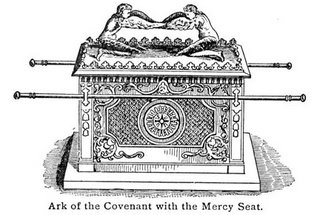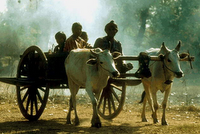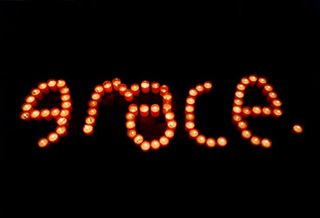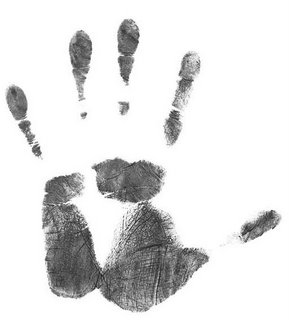Under Attack - 2 Samuel 6:1-15
 Believe it or not, no one worships Buddy Christ.
Believe it or not, no one worships Buddy Christ.For those not in the know, Buddy Christ is the fictional creation of a Catholic Priest attempting to reinvigorate his parish in the movie Dogma. Instead of the "wholly depressing" imagery of the cross, the movie recasts Jesus as a smiling cheerleader who's sure you can do it. After all, who doesn't want a kinder, gentler God who's simply more comfortable for us?
There are two questions that come out of looking at something like Buddy Christ:
- First of all, is he for real? Does this presentation line up with fact? Because we can all agree that, if God of the Bible exists, misrepresenting Him is probably a no-no.
- Is a god like this worthy of worship, honor, and/or adoration? (Especially one like your college drinking pals!)
The Original Passage (in a Modern Translation)
David again gathered all the chosen men of Israel, thirty thousand. And David arose and went with all the people who were with him from Baale-judah to bring up from there the ark of God, which is called by the name of the Lord of hosts who sits enthroned on the cherubim. And they carried the ark of God on a new cart and brought it out of the house of Abinadab, which was on the hill. And Uzzah and Ahio, the sons of Abinadab, were driving the new cart, with the ark of God, and Ahio went before the ark.
And David and all the house of Israel were making merry before the Lord, with songs and lyres and harps and tambourines and castanets and cymbals. And when they came to the threshing floor of Nacon, Uzzah put out his hand to the ark of God and took hold of it, for the oxen stumbled. And the anger of the Lord was kindled against Uzzah, and God struck him down there because of his error, and he died there beside the ark of God. And David was angry because the Lord had burst forth against Uzzah. And that place is called Perez-uzzah, to this day. And David was afraid of the Lord that day, and he said, “How can the ark of the Lord come to me?” So David was not willing to take the ark of the Lord into the city of David. But David took it aside to the house of Obed-edom the Gittite. And the ark of the Lord remained in the house of Obed-edom the Gittite three months, and the Lord blessed Obed-edom and all his household.
And it was told King David, “The Lord has blessed the household of Obed-edom and all that belongs to him, because of the ark of God.” So David went and brought up the ark of God from the house of Obed-edom to the city of David with rejoicing. And when those who bore the ark of the Lord had gone six steps, he sacrificed an ox and a fattened animal. And David danced before the Lord with all his might. And David was wearing a linen ephod. So David and all the house of Israel brought up the ark of the Lord with shouting and with the sound of the horn.
In Plain English
Having just defeated his enemies, King  David goes to retrieve the Ark of the Covenant which had been 'ingnored' during the reign of King Saul. The men load the Ark onto an oxen cart and go driving back to Jerusalem. At one point, the oxen pulling the cart stumble and the Ark begins to fall. Uzzah, trying to be helpful, reaches out to steady the Ark with his hand. As soon as he touches it, God's anger burns against Uzzah and God strikes him dead. David and his men are angry at God and afraid, so they leave the Ark with another man. His house is blessed during the time the ark is there.
David goes to retrieve the Ark of the Covenant which had been 'ingnored' during the reign of King Saul. The men load the Ark onto an oxen cart and go driving back to Jerusalem. At one point, the oxen pulling the cart stumble and the Ark begins to fall. Uzzah, trying to be helpful, reaches out to steady the Ark with his hand. As soon as he touches it, God's anger burns against Uzzah and God strikes him dead. David and his men are angry at God and afraid, so they leave the Ark with another man. His house is blessed during the time the ark is there.Three months later, David goes to retrieve the Ark and brings it into Jerusalem in the midst of a seemingly wild celebration.
Objections
Ok... Before we get to all the pointless killing, where was Uzzah killed? The Bible contradicts itself by saying that Uzzah was killed at both Nacon's threshing floor (2 Samuel) and at the threshing floor of Chidon (1 Chronicles). So much for perfect and inerrant.
The objector is right... The two passages do indicate the unfortunate event happened at places with different names. Is there a way to reconcile this? I think there is...
 Allow me an anecdote: My elementary school was across the street from a convenience store called "Quillen's Market". I dare not think how many sodas and Slim Jims I must've purchased from there over the years. Anyways, the district I was in also used the same school building as the centralized junior high - bringing in kids from surrounding town elementaries for one junior high program. Just before I got to junior high, Quillen's Market was sold and became something else (Larson's, or something like that).
Allow me an anecdote: My elementary school was across the street from a convenience store called "Quillen's Market". I dare not think how many sodas and Slim Jims I must've purchased from there over the years. Anyways, the district I was in also used the same school building as the centralized junior high - bringing in kids from surrounding town elementaries for one junior high program. Just before I got to junior high, Quillen's Market was sold and became something else (Larson's, or something like that).When I went up to the jr high, all the people who went to elemtary school in that building called the mini-mart "Quillen's". All the people who had come in from other schools called it "Larson's". We were both referring to the same little yellow building, and we knew it. But we used two different names depending on our background.
A 'threshing floor' is just a spot in a field where the wheat and the chaff were separated... It's possible that this threshing floor was shared by more than one family/town, so the author's perspective would influence the name (but not err as to the location). It is also possible that the place simply had two names. If you're from my town you'd call the swimming hole behind our old house the 'Langlois Farm hole', while people from the other town called it the 'County Road hole'.
Different names doesn't have to mean a different location, especially in an ancient, near-East culture...
Well, God sure has a tough time saying 'Thank You'... Uzzah tries to do Him a favor by keeping the Ark from tipping and God strikes him dead. What kind of God does that?
The kind who doesn't need anything... Especially help from people flaunting their indifference to Him.
Let me unpack that a little bit, since it's kinda a shocking statement... It's important to realize from the get-go that God had set out some pretty specific rules about the Ark of the Covenant... In addition to outlining its construction in detail, God also says:
You shall cast four rings of gold for it and put them on its four feet, two rings on the one side of it, and two rings on the other side of it. You shall make poles of acacia wood and overlay them with gold. And you shall put the poles into the rings on the sides of the ark to carry the ark by them. The poles shall remain in the rings of the ark; they shall not be taken from it. (Exodus 25:12-15)
At that time the Lord set apart the tribe of Levi to carry the ark of the covenant of the Lord to stand before the Lord to minister to him and to bless in his name, to this day. Therefore Levi has no portion or inheritance with his brothers. The Lord is his inheritance, as the Lord your God said to him. (Deuteronomy 10:8-9)
And when Aaron and his sons have finished covering the sanctuary and all the furnishings of the sanctuary, as the camp sets out, after that the sons of Kohath shall come to carry these, but they must not touch the holy things, lest they die. (Numbers 4:15)
The Ark was to be covered by the High Priests, approached only by the Levites, carried only by the Kohathites, and not touched by anyone... Where does permission to put the ark on an ox cart come from? It is possible (but by conjecture only) that Abinadab and his sons, Uzzah and Ahio, were all Levites. If so, they're even more culpable here since they should've known the right proper things to do. Insisting on the right conduct was their responsibility and their clan's legacy!
 Instead, we see the Ark of the Covenant - the most holy object in all of Israel - rocking back and forth on the top of an ox cart. Why? Perhaps everyone was so excited they just wanted to get back to Jerusalem faster than they could've on foot... The reason, good or bad, is really irrelevant. God had given a clear, specific command and the people present chose to ignore it (at their peril).
Instead, we see the Ark of the Covenant - the most holy object in all of Israel - rocking back and forth on the top of an ox cart. Why? Perhaps everyone was so excited they just wanted to get back to Jerusalem faster than they could've on foot... The reason, good or bad, is really irrelevant. God had given a clear, specific command and the people present chose to ignore it (at their peril).Did God actually need Uzzah to catch the Ark? Of course not. God could've held the Ark on the cart Himself. He could've prevented the oxen from stumbling, or even levitate the Ark all the way to Jerusalem once it had become unsteady...
God had told them that touching the Ark was prohibited and carried a death sentence... Uzzah got what he deserved, so to speak.
Why couldn't people touch the Ark anyway? What's the big deal?
The short answer is 'Sin'. We are a stained people who, at our core, are as hostile to God as Arabs are towards Israelis (and vice-versa). To simply enter the section of the tabernacle that held the Ark was itself an arduous process of ritural cleansing and sacrifices - all to make the person pure enough to stand in the presence of God and no be consumed.
John MacArthur, a far wiser man than I, sums it up as follows:
God did not want His Ark on a cart, even a new cart. This was flippant. This was human. This was disobedient... And so they're popping along on the cart and everybody's happy and they're playing instruments in verse 5 and harps and psalteries and timbrels and cornets. "And they came to Nachon's threshingfloor," which is just a geographical point in the little trip, and the thing must have hit a little mud hole or a chuck hole and the cart went into a jolt and the Ark started to move. "And Uzzah," he was a Kohathite, he was in charge of this, "he just put his hand out to steady the Ark, I mean, he didn't want it to be defiled by hitting the ground." But what he didn't know was that the ground wasn't defiled, the human race was, nothing wrong with the ground. Dirt never fell [into sin or rebellion], man did. So when he touched the Ark, dead on the spot. And you say, "Well, he's a poor fella, I mean, he doesn't go out and commit adultery, he doesn't have 800 wives, he just goes...and he's out of existence, just that fast." But it was a careless and arrogant sin which came about because he was not obedient to the Word of God. [from this sermon]
'Nuff said...
So, what does this say to us today?
The applications here should be obvious...1) God's complete patience and grace: I can hear people's brains frying right now... "Wait just a minute! How can you possibly make your first point some platitude about God's grace after He just struck someone dead?"
Because it's true. This passage is a clear display of God's grace in action.
 Here's the reality: If God was not gracious, he would've killed everyone in the story. "They went to retrieve the Ark, God killed them all, and that's all folks." Not a very good story. But it would be just! Everyone in the story was out of line. As we discussed above, the ark was uncovered (punishable by death for all who looked upon it), it was being approached by non-Levites (punishable by death), and carried improperly (punishable by death). That God tolerated all these sins leading up to Uzzah's folly is nothing but an example of grace.
Here's the reality: If God was not gracious, he would've killed everyone in the story. "They went to retrieve the Ark, God killed them all, and that's all folks." Not a very good story. But it would be just! Everyone in the story was out of line. As we discussed above, the ark was uncovered (punishable by death for all who looked upon it), it was being approached by non-Levites (punishable by death), and carried improperly (punishable by death). That God tolerated all these sins leading up to Uzzah's folly is nothing but an example of grace.Even beyond this story, our sin holds us in a dicey position. Truth is that every sin we committ is equally offensive to God. Any one of us could be justly struck down for our own sins were it not for God's grace. And even though we are that faulty, God has given us a way to receive reconciliation with Him and find forgiveness for all our sins. All that is found in through the death of Jesus Christ as a substitute for our rightful punishment.
That's good news!
2)God's complete holiness: While God's grace is real, we shouldn't dillute ourselves into thinking that somehow makes God a softie who can't put His foot down. God hates sin and He will see it punished... His very nature demands that sin be dealt with.
I was mentioning to coramdeo this weekend that I had a silly dream. In it, the fam and I were at some wedding thing. I noticed noticed the groom all dressed in a white/silvery tuxedo, then noticed by daughter playing around in a dust puddle as she loves to do. Then I got to watch the amusing sight of my 2 year-old daughter chasing the groom around as he fled from her dirty hands.
 While God doesn't run from us and our sin, He can't tolerate it any more than that groom wanted to have dirty handprints on his lovely duds (not to mention in the wedding pics, immortalized for all time). When we come to God, we must remember that He is not like us. He is pure, holy, and jealous for His own glory. When we enter the picture with sin, God's wrath burns against it... If it didn't, He really wouldn't be God. If He could tolerate evil, He wouldn't be perfectly good. If He could allow wickedness to go unpunished, He wouldn't be just. He's either a perfect God who is holy and glorious, or He isn't. We can't have it both ways.
While God doesn't run from us and our sin, He can't tolerate it any more than that groom wanted to have dirty handprints on his lovely duds (not to mention in the wedding pics, immortalized for all time). When we come to God, we must remember that He is not like us. He is pure, holy, and jealous for His own glory. When we enter the picture with sin, God's wrath burns against it... If it didn't, He really wouldn't be God. If He could tolerate evil, He wouldn't be perfectly good. If He could allow wickedness to go unpunished, He wouldn't be just. He's either a perfect God who is holy and glorious, or He isn't. We can't have it both ways.I started this post off by talking about 'Buddy Christ'... If I'm really honest with myself, I need to admit that I don't really want a god in my life who I could just hang out with and 'be myself'. That's not someone worthy of worship. They're just like me, and I know that I'm nothing to write home about.
Wouldn't one naturally expect that the God of the universe would leave us feeling a little uncomfortable with ourselves and our actions? My VBC readers (as if there's any other kind) will be familiar with this illustration since coramdeo used it in a sermon a couple days ago... In The Lion, The Witch, and The Wardrobe, the Beavers tell the children that Aslan, the true ruler of Narnia, is around. They also tell the children that Aslan is a lion - and not a safe one.
I don't really want a 'safe' God. I hope you don't either.
Lastly, this passage (as do most in the Bible) continues to point at our need for redemption. Our sin separates us from fellowship with God and will receive punishment. We can either take that on ourselves, or embrace our need and the only substitute that God has given for our atonement - Jesus Christ.
But that deserves a much longer post... So, we'll come back to that later.
Labels: Bible

0 Comments:
Post a Comment
<< Home